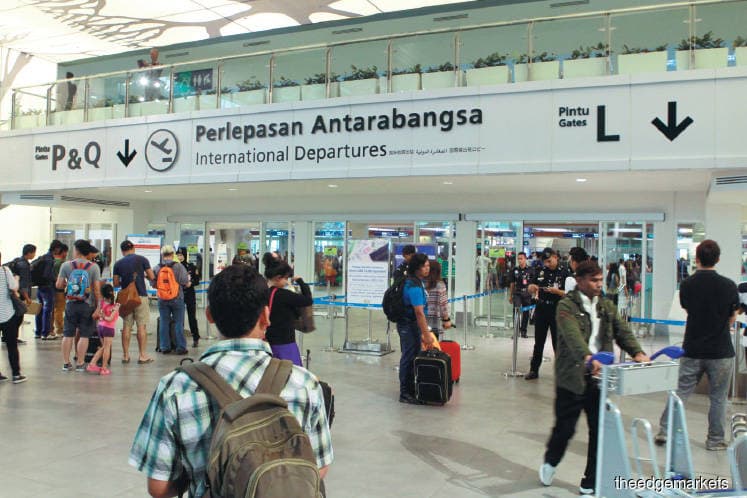
This article first appeared in The Edge Financial Daily on September 3, 2019
KUALA LUMPUR: In a knee-jerk reaction to the announcement of the passenger service charge (PSC) cut, investors dumped Malaysia Airports Holdings Bhd (MAHB) shares last Friday even as the group reported an 86% leap in quarterly profit.
The immediate concern is that MAHB’s earnings will be affected substantially by the ministry of transport’s announcement that the PSC on passengers travelling beyond Asean will be reduced to RM50 across all airports, except Kuala Lumpur International Airport (KLIA).
Interestingly, the revised rate is the same amount that AirAsia Group Bhd and AirAsia X Bhd had collected from their passengers before raising to RM73 on Aug 9.
Analysts said the PSC cut should not be a reason to sell MAHB’s shares simply because the airport operator’s earnings will not be affected at all. Under the operating agreement that it signed with the government 10 years ago, MAHB is entitled to a benchmark PSC. If the PSC charged is set below the benchmark, MAHB will recover the difference by paying a proportionally lower user fee to the government.
In short, MAHB, which operates 39 airports across the country, will pay less user fee to the government to make up for the shortfall. It is the government that will lose out by cutting the PSC as the user fees it will receive from MAHB will shrink.
“MAHB is pretty much isolated from the PSC cut. It is unlikely to have any impact on its earnings,” said an analyst who tracks the stock.
MAHB’s share price plunged as much as 50 sen or 5.85% to RM8.05 last Friday after the news on the PSC cut. The stock managed to regain some lost ground to close the day at RM8.23, down 32 sen or 3.74% — the second biggest fall in terms of percentage this year.
To put things in perspective, of the 99.03 million passenger movements in all airports operated by MAHB last year, 60.55% (or 59.96 million) were in KLIA and klia2, according statistics provided by MAHB.
klia2 alone accounted for 31.86 million or 32.17% of the tally, while KLIA contributed 28.10 million or 28.38%.
Among the 99.03 million passengers, some 26.18 million of them (or 26.4%) were international travellers for non-Asean destinations. The number of international travellers using KLIA was 13.98 million (or 53.4%), while the remaining 12.2 million (46.6%) were using other airports, including klia2.
On the back of the envelope calculation, the RM23 reduction will mean the collection would decline by an estimated RM280.6 million based on 12.2 million international travellers.
The announcement on the PSC cut for international travellers has in fact stolen the limelight from MAHB’s latest quarterly financial results which were released at the noon break.
The group achieved an 86% jump in net profit to RM160.08 million for the second quarter ended June 30, 2019, from RM86.12 million a year earlier on the back of higher revenue. Quarterly revenue grew to RM1.26 billion from RM1.15 billion previously.
The airport operator’s quarter results came in stronger than market expectations, according to analysts.
MAHB’s share price has been trending upwards in recent months from the low of RM6.52 in mid-April and it hit a high of RM8.82 on July 10 amid the expectation that the implementation of the Regulated Asset Base Framework on PSC will augur well for the group and provide better earnings visibility.
Some said last Friday’s selling could also be partly due to the fact that the stock price has rallied for a while. The PSC cut provided an excuse to take profit.
Meanwhile, the International Air Transport Association (IATA) said that while the reduction in PSC for beyond Asean destinations is positive for most travellers in Malaysia, “we are disappointed the government has chosen to discriminate against the airlines and 28 million passengers using KLIA”.
If the intention is to offset the increased charges due to the departure levy which was introduced on Sept 1, the more straightforward way is to remove the departure levy altogether,” IATA’s regional vice-president for Asia-Pacific Conrad Clifford said in a statement yesterday.
“By introducing this change, the government is creating an uneven playing field for airlines, as well as cross-subsidisation of other airports/terminals by the users of KLIA.
“The government has also undermined Mavcom’s (Malaysian Aviation Commission) credibility as a result. Mavcom is the appointed economic regulator for airports and has the mandate and authority to determine airport charges. There is an established process for setting airport charges,” Clifford said.